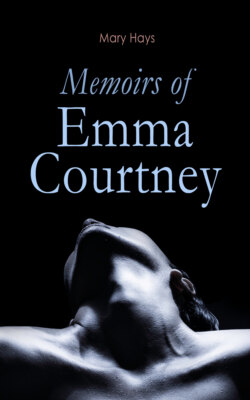Читать книгу Memoirs of Emma Courtney - Mary Hays - Страница 7
На сайте Литреса книга снята с продажи.
CHAPTER III
ОглавлениеTable of Contents
It will now be necessary, for the development of my own particular character, again to revert to earlier periods.—A few days before my birth, my aunt had lost (as already related) a lovely female infant, about four months old, and she received me, from the hands of my dying mother, as a substitute.—From these tender and affecting circumstances I was nursed and attended with peculiar care. My uncle's ship (it being war time) was then waiting for a convoy at Portsmouth, where he was joined by his wife: she carried me with her, and, tenderly watchful over my safety, took me on all their little excursions, whether by sea or land: I hung at her breast, or rested in her arms, and her husband, or attendant, alternately relieved her.—Plump, smiling, placid, happy, I never disturbed her rest, and the little Emma was the darling of her kind guardians, and the plaything of the company.
At the age at which it was thought necessary to wean me, I was sent from my tender nurse for that purpose, and consigned to the care of a stranger, with whom I quickly pined myself into a jaundice and bilious fever. My aunt dare not visit me during this short separation, she was unable to bear my piercing cries of anguish at her departure. If a momentary sensation, at that infantine period, deserve the appellation, I might call this my first affectionate sorrow. I have frequently thought that the tenderness of this worthy woman generated in my infant disposition that susceptibility, that lively propensity to attachment, to which I have through life been a martyr. On my return to my friends, I quickly regained my health and spirits; was active, blythsome, ran, bounded, sported, romped; always light, gay, alert, and full of glee. At church, (whither on Sunday I was accustomed to accompany the family) I offended all the pious ladies in our vicinity by my gamesome tricks, and avoided the reprimands of my indulgent guardians by the drollery and good humour which accompanied them.
When myself and my little cousins had wearied ourselves with play, their mother, to keep us quiet in an evening, while her husband wrote letters in an adjoining apartment, was accustomed to relate (for our entertainment) stories from the Arabian Nights, Turkish Tales, and other works of like marvellous import. She recited them circumstantially, and these I listened to with ever new delight: the more they excited vivid emotions, the more wonderful they were, the greater was my transport: they became my favourite amusement, and produced, in my young mind, a strong desire of learning to read the books which contained such enchanting stores of entertainment.
Thus stimulated, I learned to read quickly, and with facility. My uncle took pleasure in assisting me; and, with parental partiality, thought he discovered, in the ardour and promptitude with which I received his instructions, the dawn of future talents. At six years old I read aloud before company, with great applause, my uncle's favourite authors, Pope's Homer, and Thomson's Seasons, little comprehending either. Emulation was roused, and vanity fostered: I learned to recite verses, to modulate my tones of voice, and began to think myself a wonderful scholar.
Thus, in peace and gaiety, glided the days of my childhood. Caressed by my aunt, flattered by her husband, I grew vain and self-willed; my desires were impetuous, and brooked no delay; my affections were warm, and my temper irascible; but it was the glow of a moment, instantly subsiding on conviction, and when conscious of having committed injustice, I was ever eager to repair it, by a profusion of caresses and acknowledgements. Opposition would always make me vehement, and coercion irritated me to violence; but a kind look, a gentle word, a cool expostulation—softened, melted, arrested, me, in the full career of passion. Never, but once, do I recollect having received a blow; but the boiling rage, the cruel tempest, the deadly vengeance it excited, in my mind, I now remember with shuddering.
Every day I became more attached to my books; yet, not less fond of active play; stories were still my passion, and I sighed for a romance that would never end. In my sports with my companions, I acted over what I had read: I was alternately the valiant knight—the gentle damsel—the adventurous mariner—the daring robber—the courteous lover—and the airy coquet. Ever inventive, my young friends took their tone from me. I hated the needle:—my aunt was indulgent, and not an hour passed unamused:—my resources were various, fantastic, and endless. Thus, for the first twelve years of my life, fleeted my days in joy and innocence. I ran like the hind, frisked like the kid, sang like the lark, was full of vivacity, health, and animation; and, excepting some momentary bursts of passion and impatience, awoke every day to new enjoyment, and retired to rest fatigued with pleasure.
